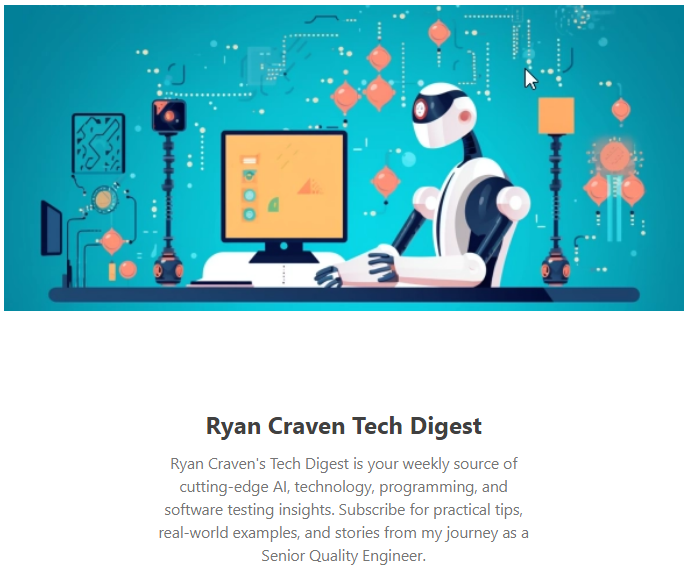Navigating the Future of Work: Adapting to AI and Automation
Written on
The Evolution of Work in the Age of AI
The swift progress of technology, especially automation and artificial intelligence (AI), is reshaping our lives and work environments. As these innovations continue to advance, the job market is bound to transform, compelling employees to adjust to this new reality. This article delves into how automation and AI influence employment and outlines strategies for individuals to succeed in the future workforce.
The Effects of Automation and AI on Employment

Photo by Ross Findon on Unsplash
Job Displacement Concerns
A significant concern surrounding automation and AI is the potential for job losses. Positions that involve repetitive tasks, particularly in industries like manufacturing, retail, and transportation, are at a heightened risk of automation. However, it’s important to view job displacement through a broader lens — it can also foster new roles and opportunities in the job market.
Emergence of New Jobs
The rise of automation and AI will inevitably give birth to new job roles that we might not yet envision. Just as the internet spawned professions such as social media managers and app developers, AI and automation are likely to lead to the creation of entirely new fields. We are already witnessing a surge in demand for positions like data scientists, AI ethicists, and robotics engineers. As technology advances, the need for skilled individuals to design, maintain, and oversee these systems will increase.
Transformation of Existing Roles
While some jobs will be phased out and new ones formed, many current positions will experience significant shifts. The integration of AI and automation will alter the tasks performed by workers. Therefore, employees must adapt and enhance their skill sets to remain valuable in the evolving job market.
Strategies for Workers to Flourish

Photo by Mark Fletcher-Brown on Unsplash
Continuous Learning and Skill Development
To thrive in this changing job landscape, workers should prioritize continuously upgrading their skills. This can involve upskilling, which focuses on enhancing existing skills for career advancement, or reskilling, which entails learning new skills to transition into different careers. Both paths are essential for maintaining competitiveness in the age of automation and AI.
Embracing Flexible Work Environments
The COVID-19 pandemic has accelerated the trend toward remote work, a shift likely to persist post-crisis. This means that remote opportunities will become more common, allowing workers to tap into job markets beyond their local areas.
Fostering Soft Skills and Emotional Intelligence
As automation takes over more routine tasks, the demand for soft skills such as communication, teamwork, critical thinking, and problem-solving will grow. Emotional intelligence, which encompasses empathy, self-awareness, and relationship management, will become a key differentiator in the job market. Workers should focus on nurturing these competencies to remain relevant as automation and AI evolve.
Targeting High-Growth Sectors
Industries like healthcare, technology, renewable energy, and data analysis are projected to witness substantial growth in the coming years. Workers should consider pursuing careers in these high-demand fields to enhance their prospects for stable and lucrative job opportunities.
Committing to Lifelong Learning
Given the rapid pace of technological change, workers must adopt a lifelong learning mentality. Staying informed about industry trends and technological advancements is vital for future success. Engaging in continuous education, participating in online courses, attending workshops, and reading related publications will help workers stay competitive.
The Role of Institutions in Workforce Preparation

Photo by Randy Fath on Unsplash
Developing Education and Training Initiatives
It is crucial for governments and organizations to prepare the workforce for the future. This involves establishing education and training programs that equip workers with relevant skills. These initiatives should be accessible and affordable for everyone, regardless of their current employment status or educational background.
Supporting Workers in the Gig Economy
As the gig economy grows, more individuals are turning to freelance and contract work in light of changing job dynamics. Governments and organizations should offer support to gig workers through social protections, access to benefits, and networking opportunities.
Encouraging Innovation and Entrepreneurship
Innovation and entrepreneurship will be vital for driving economic growth and creating new jobs amid automation and AI. Governments and organizations should cultivate a supportive environment for entrepreneurs by providing resources, funding, and mentorship.
In conclusion, while the future of work may seem uncertain, it is clear that automation and AI will continue to redefine the job market. By embracing lifelong learning, enhancing soft skills, and focusing on high-demand sectors, workers can adapt and flourish in this new landscape. Moreover, governments and organizations play a pivotal role in preparing the workforce for these changes through education, support, and promoting innovation.
This video discusses the implications of excessive automation and AI on future employment, highlighting both challenges and opportunities in the evolving job market.
This video explores how automation is shaping our workforce, emphasizing the need for adaptation and skill development in response to technological changes.
To stay updated on future posts, consider subscribing to my newsletter below:
